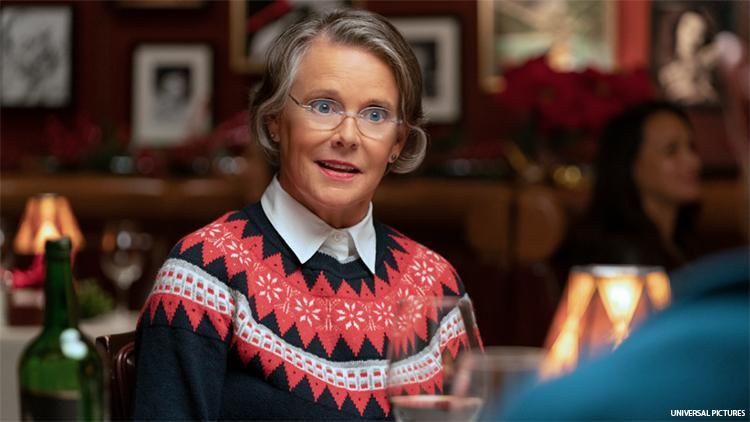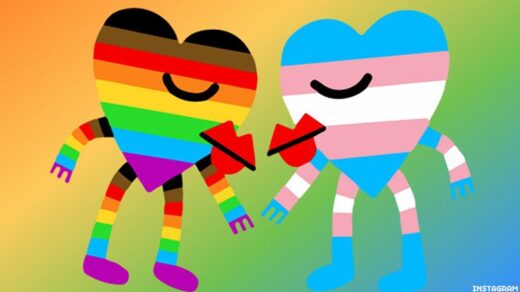Amanda Bearse, an LGBTQ+ Icon, Reemerges in ‘Bros’
Author: John Casey

The first time I heard the term “lipstick lesbian” was when Amanda Bearse, a costar on one of Fox’s most iconic programs, Married … With Children, came out as a lesbian in 1993.
If you were around in 1993 — or old enough to vote in that year, let’s say — you know that at that time the words gay or lesbian, to the uninitiated and/or naive, were usually dumbed down to stereotypes. Lesbians were “butch” and “manly,” and gay men were “limp-wristed” and “queer.” There were other words, of course, that were much harsher. It was a time when anyone who was queer — in today’s parlance — came out and went against those stereotypes, people feigned utter shock.
Bearse played the “hot” neighbor Marcy D’Arcy to Al and Peg Bundy on Married … With Children. She was married to Jefferson, played by hot actor Ted McGinley. Marcy was the butt of many sexist jokes about her hotness, but she gave as good as she got, introducing trouble to storylines by stirring the pot at the beginning of many episodes.
Her coming-out in 1993 was a big deal, mainly because, again, the character she played on the show went against stereotypes. The program was Fox’s biggest hit, and it had been on the air since 1987, so Bearse was very well known. I distinctly recall discussing Bearse being a lesbian with one of my women friends at the time, and she referred to Bearse as a “lipstick lesbian,” which meant that Bearse was considered pretty and feminine.
Looking back, you can see how derogatory and chauvinistic a comment like that was. Similarly, if you watch Married … With Children today, it can be cringeworthy. In a recent interview with Page Six, Bearse admitted the show was “very misogynist.”
Bearse is back in the news and back in the spotlight with her exceptional star turn in Billy Eichner’s new comedy Bros. And I couldn’t be more thrilled for her. I always admired Bearse for what she did nearly 30 years ago. For that, she is a gay icon, and although Ellen DeGeneres is often given credit as the first out TV star when she announced she was gay four years later, it was Bearse who first broke the glass ceiling for gay television actors.
For the better part of nearly 30 years, Bearse has kept a low profile and sacrificed a career to raise her daughter in a better environment far from Hollywood. When we caught up this week, Bearse was relaxing in Palm Springs, Calif. Having just turned 64, she is enjoying life and the accolades she’s receiving from her role in Bros.
“I am so very proud of this film,” Bearse began. “Nick Stoller, the director, and Billy created such a beautiful story, and they really got it right. It’s a laugh-out-loud funny film, and at the same time, it’s authentic and well-rounded. It was a joy for me to work on this. I hadn’t been on the big screen in 40 years when I did the horror film Friday Night, so during production of Bros, I just kept pinching myself and thinking how lucky I was to be a part of an all-gay cast and with a film that makes such a powerful statement.”
Bearse said she loved playing the stereotypical conservative straight mom. I asked her how the part came about? .“I hadn’t been on an audition or a reading in 25 years, and the last time I was probably playing someone’s daughter, and now I’m playing a mom, so go figure,” she laughed. “But I got the role and I tried to create a character that was similar to my dear mom.”
I wondered if her daughter, Zoe, thought Bearse’s character was anything like Zoe’s mom. “No, she’s seeing her grandmother, who was known as Big Ann. People who know me know that I was just creating a character, since that’s not me. My hope is that I found some of the softest aspects of my mother in the same way I tried to nurture my daughter.”
“My daughter is my greatest production,” Bearse said proudly. “We moved to Washington State after Hollywood so that she could go to school and live as much of a normal life as you can. And I worked when I wanted to and when I was hired, which was mainly behind the camera, and did so on my own terms.”
It’s a little-known fact that Bearse directed 31 episodes of Married … With Children, and she did so primarily to have a backup career in case the acting jobs went away after the show stopped production. “I’m a realist, so I tend to look at life, well, not through rose-colored glasses, let’s put it that way,” Bearse said with a chuckle. “I thought, if I can’t act, then I can direct, so I made a choice to work behind the camera which allowed for anonymity.”
While shooting Married … With Children, Bearse would use week-long hiatuses to direct other shows, such as Reba, Malcom & Eddie, and The Jamie Foxx Show. “I was getting lots of directing work, and no one seemed to care about my sexuality,” she recalled.
When Bearse looks back on that famous moment of coming out, what does she think about? “It was on a very personal level, and it was a time when my personal and professional life integrated. I was out to everyone in my personal life. They knew I was gay, but I didn’t share it with all of Hollywood to see. At the time, I was just an actor in a television show who was starting to direct more. We weren’t sure how the announcement would impact the show, but it didn’t, and fortunately the show continued to run,” she said.
“It wasn’t until the series E! True Hollywood Story ran after the show had wrapped that I learned how much of a discussion there was about my coming-out at the highest level of the network. It never trickled down to me.”
Did she feel any resentment about DeGeneres usually being credited with being the first television star to come out? “No, not all. Ellen was creating a brand. It was her show and named for her, Ellen, and she was on a more mainstream network, ABC. You have to remember that at that time, Fox, where Married … With Children ran, was the fourth-rated network and was known as sort of an unconventional newcomer. If the show was called Amanda, then it might have been different for me.”
As a result of Bearse coming out, she worked with the Human Rights Campaign to launch National Coming Out Day. ‘Besides being a mom, I’m most proud of my role in helping this day become more prominent and meaningful day in LGBTQ+ history,” she said.
DeGeneres was for all intents and purposes canceled from Hollywood for several years after she came out. Did Bearse experience anything similar once Married … With Children ended? “My career took a different trajectory since I chose to move out of Hollywood for my child. As Zoe grew, my career wasn’t in L.A., but I would still try to get work when I could, but it wasn’t easy.”
“I know it wasn’t and isn’t easy because it was told to me that I wasn’t being hired because of my age, and that started happening after I turned 50. Men my age and older continue to direct, and while my résumé is the same length as theirs, the work flowed more readily to them. I didn’t kick or scream about it. But getting work has had nothing do with my being a lesbian, and mostly to do with sexism and ageism.”
Finally, I asked Bearse about getting older, specifically how she felt on Bros where she and fellow LGBTQ+ icon Harvey Fierstein were the elder queers, although when I asked the question, “queers” came out as “queens.” “Did you say queens? I’ll take queen!” Bearse laughed. Seriously, I wondered if there was anything about that title — being an elder queer — that she especially enjoyed?
“I embrace the word queer as all-encompassing and how inclusive it is. When you look back at terms like lipstick lesbian that you mentioned earlier, queer was also a word that was detrimental, and I’m glad we’ve taken that word back and owned it, for example saying something like ‘Eichner’s cast in Bros is all queer.’ Imagine how that would have been perceived 30 years ago.”
John Casey is editor at large for The Advocate.
Views expressed in The Advocate’s opinion articles are those of the writers and do not necessarily represent the views of The Advocate or our parent company, Equal Pride.
Original Article on The Advocate
Author: John Casey





